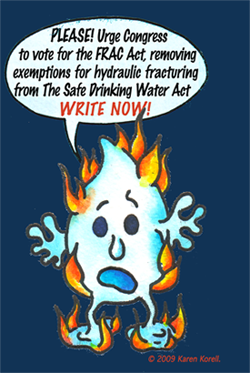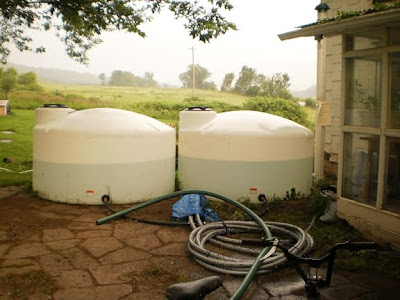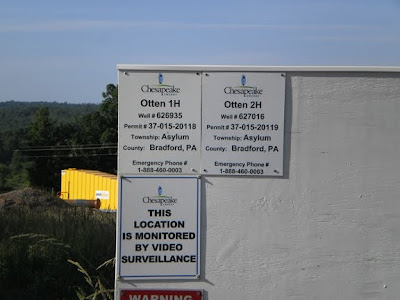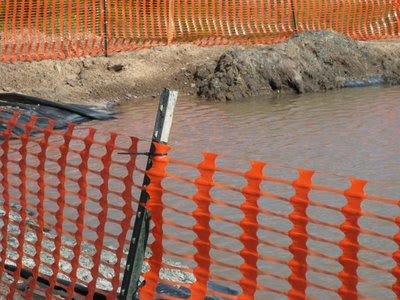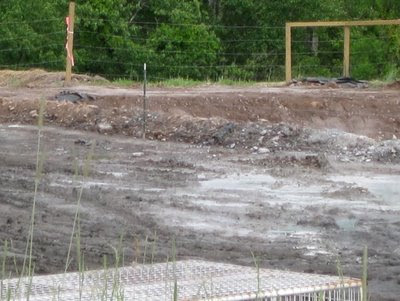by laura legere (staff writer)
thetimes-tribune.com
Published: June 21, 2010
 (click to enlarge)
(click to enlarge) Fear about environmental damage from Marcellus Shale natural gas drilling is often trained on what could happen deep underground, but some of the gravest hazards posed by the process are driven in trucks, stored in tanks, carried through hoses and left in pits on the surface of natural gas well sites.
Concentrated chemicals, as well as wastewater containing toxic levels of salts and metals, are stored, produced or transported in large quantities at each well site, creating the potential for tainting drinking water or seeping into local ponds and streams.
While recent incidents at Marcellus Shale wells involving explosions, blowouts and methane-contaminated drinking water have drawn attention to the dangerous potential of the activity, information about the industrywide frequency and impact of spills and leaks has not been reported publicly.
Department of Environmental Protection files made available to The Times-Tribune through a Right-to-Know request reveal hundreds of examples of spills at natural gas drilling sites in the state during the last five years, recorded by at least 92 different drilling companies.
The documents show that many of the largest operators in the Marcellus Shale have been issued violations for spills that reached waterways, leaking pits that harmed drinking water, or failed pipes that drained into farmers' fields, killing shrubs and trees.
The frequency of violations has kept the state's gas inspectors on the run.
After a Marcellus Shale hearing last week, DEP produced a list for state legislators of 421 violations found by inspectors at Marcellus Shale wells this year through June 4.
At least 50 of the violations - recorded by 15 different Marcellus operators - involved a spill to soil or water. Generic descriptions used by the department to characterize the violations make it impossible to determine the exact number of spills.
"It goes from an accident to negligence," DEP Secretary John Hanger said at the hearing, and attributed the problems to "poor management" and "not proper oversight" by the companies.
"This industry's got to look in the mirror," he said.
Kathryn Klaber, the director of the Marcellus Shale Coalition, a Pennsylvania industry group, said shale drilling is an industrial activity, like many others.
"Any spill is a problem," she said. "For PR (public relations) reasons, for fines, for reputation, stock price - there's no good reason to have one."
(Notice she doesn't even mention environmental harm... just PR, fines, reputation and stock price!)
But, she added, "I think if we were looking across multiple industries ... the question I'd like to pose is, is it worse or better than others?"
(THE INCREDIBLE ARROGANCE OF THIS KIND OF THINKING NEEDS TO BE REDRESSED! ...Comparison to greater destruction is no excuse, it's just inexcusable! -Splashdown)
The following list highlights examples of spills, seeps and accidents as described in DEP documents that have been committed by an array of Marcellus Shale operators.
It illustrates that none of the companies currently pulling gas from the shale has been able to avoid potentially harmful accidents and errors.
Spills and leaks near a state forest
An accident at a Marcellus Shale well in early June caused a geyser of gas and wastewater to erupt for 16 hours on property owned by a private hunting club in the middle of a state forest frequented by campers and anglers.
The well is one of 44 permitted or pending Marcellus Shale wells operated by Houston-based EOG Resources on the hunting club land in Clearfield County, and the nearly catastrophic rupture was a dramatic demonstration of the hazards of natural gas drilling.
But months before that incident, a seemingly invisible plume of contamination affected water sources around the same EOG lease, prompting months of investigation by DEP.
Beginning in late August 2009, inspectors found evidence that Marcellus Shale waste fluids had impacted Alex Branch, a wild trout stream and high-quality fishery, and damaged the drinking water at a nearby hunting camp, where water tests found barium that was four times above the state and federal drinking water limits - an amount that can cause vomiting, diarrhea and muscle weakness after drinking it for even a short period of time.
DEP inspectors had not noticed any evidence of a spill from the nearest EOG well site and could see nothing wrong with the earthen pit where the company stored the well's waste, but it was determined that undetected seeps from one pit, and maybe several, most likely caused the wastewater to contaminate the stream.
An accident in early August may also have contributed to the damage when a small hole in a hose carrying wastewater from the well sprayed a fine mist for several days that landed on nearby plants and a small wetland. A heavy rain swamped the pad, likely washing the fluids downhill to the hunting camp and stream.
In response to the leaks, EOG excavated the suspected faulty pit and another nearby pit, backfilled other unused pits on the lease and transitioned to a system in which drilling fluids and waste drawn from a well are piped to closed tanks rather than pits, which helps to minimize the risk of seeps and overflows. In an e-mail to DEP, the EOG environmental safety administrator said the company would transition to the safer systems, which are not required by Pennsylvania law, because "we don't want to risk anything."
In a separate incident, on Oct. 12, 2009, a leak in a tank used to store a fluid mixture of water and hydraulic fracturing chemicals spilled about 7,980 gallons, most of which was absorbed into the ground.
It caused a nearby tributary to Alex Branch to turn cloudy and suds when agitated.
An EOG spokeswoman said the company "regrets these incidents occurred and took immediate steps to address the issues," including adopting new operating procedures and hiring outside contractors to perform water sampling after both events.
Acid leaks and unlabeled tanks
Twice in two months, hydrochloric acid spilled at two wells sites operated by Chesapeake Appalachia in Bradford County - including once when the company used a tank that was not meant to store the acid.
Alarmed notes from an inspector's telephone conversation with the tank's manufacturer at the time of the first spill, at the Chancellor well site in Asylum Twp. in February 2009, showed the tank was not designed or lined to hold 36 percent hydrochloric acid, and that even less concentrated acid should only have been held for a day and a half.
"Somebody messed up big time to put 14,000 gall. 36% HCL in a frac tank for 30 days!!" the note stated.
DEP records also show the same inspector pursuing concerns about the proper labeling of the tank, which was one among between 25 and 50 identical 500-barrel, corrugated wall storage tanks on site without placards to differentiate it.
"It's bad enough dealing with unlabeled 55 gallon drums in our line of work," he wrote in an internal e-mail, "but having to contend with unlabeled 21,000 gallon acid 'frac' tanks in the boondocks, on properties that have unrestricted access, is a bit much."
The second acid spill, at the Vannoy well site in Granville Twp., may have contributed to the contamination of a private pond and a 30-foot swath of dead or stressed vegetation, including several evergreen trees.
The 420-gallon acid spill was one of several accidents at the site DEP thought might have caused the damage, including a spill of several thousand gallons of water on March 3, 2009, that was never tested for metals and salts, the hallmark constituents of Marcellus Shale wastewater.
The acid spill, on March 20, also flowed into the pond. Chesapeake neutralized the acid and removed the contaminated soil, but a cleanup plan commissioned by the company in December said some of the acid likely percolated through the pad and may have remained perched on the shallow bedrock causing additional contamination.
In July, DEP inspectors found stained areas at the base of a waste pit where the company left rock cuttings and drilling fluids in direct contact with the ground, and said the stain was a sign that drilling fluid "either has or is seeping from the pit."
DEP fined Chesapeake $27,271.93 and its hydraulic fracturing contractor BJ Services $8,598.46 for the second hydrochloric acid spill in February 2010, a fine the agency never announced publicly.
Brian Grove, Chesapeake's director of corporate development, said the company "responded proactively to both situations" and "learned very valuable lessons from the incidents." It turned those lessons into new operating practices, including requiring secondary containment for all materials brought to a pad, he said.
Hydrochloric acid on public roads
A worker for Fortuna Energy (now called Talisman Energy USA) drove a tanker leaking hydrochloric acid about 2½ miles over public roads between two of the company's well sites in Troy Twp., Bradford County, on June 30, 2009.
At the second site, the driver, wearing an acid-resistant suit and a respirator, tried to put a catch pan under the leak, passed out from inhaling the fumes and was taken by helicopter to Robert Packer Hospital in Sayre. The tanker lost between 100 and 200 gallons of acid and contaminated soil was later removed from both sites.
Talisman did not report the spill to DEP until late the next day, a delay DEP officials called "unacceptable."
A February 2010 press release from DEP announced a $3,500 fine for some incidents at one of the pads involved with the acid spill, but it did not address that spill. It also did not address three drilling wastewater spills in July and August 2009 on the same two well pads.
Efforts to reach a Talisman spokesman were unsuccessful. In the company's written response to DEP after the acid spill, the operations manager said it "takes the issue very seriously" and he visited each well site to emphasize to workers "the importance of our zero spill approach."
Mud eruption in a wetland
Crews for Chief Gathering - the pipeline subsidiary of driller Chief Oil and Gas - were boring a path for a pipeline 13 feet under a stream, wetland and road in Penn Twp., Lycoming County, on December 12, 2009, when the muds used to drill the hole erupted to the surface, spilling between 3,000 and 6,000 gallons into the wetland.
Initial reports from the company estimated the spill to be only about 100 gallons and to have stopped at least 10 feet away from the stream, but the DEP inspector who was called two days later found sandbags and a silt sock right at the water's edge and the barrier did not prevent some of the mud from reaching the stream.
Efforts to clean up the spill were slowed, first because the muds clogged the suction hoses the company used to try to remove it from the wetland, and later because the fluids froze solid.
While he was on site, the inspector also saw evidence of muds in a roadside ditch and was told that there had been another, unreported spill on December 10 of about 110 gallons.
The inspector noted that chemical safety sheets provided by the company for the mud, "Hydraul-EZ," listed the ingredients bentonite, a kind of clay, and a "bentonite extender," but the manufacturer "claims that any further details about these substances is proprietary" making it "difficult" to determine the potential of the mud to cause pollution.
Kristi Gittins, a Chief spokeswoman, said that the spilled mud is "not hazardous. It's dirt."
"There were no chemicals, and the DEP knows that," she said.
The remedy for such a spill is to "let it settle," she said, which is what the company was told to do.
Overflowing waste pit 1
More than 30,000 gallons of diluted wastewater overflowed a waste pit, rushed over a barrier and soaked a pasture on June 3, 2009, when workers transferring the fluid to the site owned by East Resources in Tioga County accidentally dumped too much into the pit.
The spill was first noticed by DEP inspectors, who happened to stop by the well pad.
The fluid was diluted enough, and cleaned up quickly enough, not to kill or stress vegetation, and the fluid did not appear to reach a stream.
The pit was among four at East Resources well sites in Tioga and Potter counties that discharged the wastewater they were holding. The three other pits all leaked and at least one was concentrated enough to kill or stress nearby vegetation.
East is finalizing a consent order with DEP that covers those and about 30 other violations at its sites, according to a violation notice posted on a DEP database that indicates the company will pay a $29,000 fine.
Stephen Rhoads, East's director of external affairs, said the spill was an "unfortunate accident" with no long-term impact.
"Working with DEP, we took care of it immediately," he said.
Overflowing waste pit 2
A 750,000-gallon pit holding a mixture of fresh water and wastewater overflowed off a well pad run by Atlas Resources in Washington County, through a drain and into a small tributary in a high quality watershed on December 5 and 6, 2009.
The spill was reported to DEP by the property owner, who noticed the spill before Atlas saw or reported it. It apparently was caused by a pump that turned on automatically but had no mechanism for turning off automatically when the pit was full.
The spill, for which the company has not been fined, is one of several violations the company has recorded in southwestern Pennsylvania. In January, DEP fined Atlas $85,000 for violations at 13 well sites between December 2008 and July 2009, including improper erosion controls and site remediation, and spills of diesel fuel and wastewater.
In late March, on the same Hopewell Twp. farm as the pit overflow, liquid hydrocarbons called condensate on the surface of a 400,000-gallon wastewater pit caught fire, engulfing the pit and burning its plastic liner, causing a plume of black smoke that was visible for miles.
Atlas, a Pennsylvania company, also drills non-Marcellus Shale natural gas wells, including one near Kushequa, McKean County which DEP found to have caused explosive levels of methane and ethane to seep into residential water supplies and triggered a small explosion in the village's public well in late 2007.
Efforts to reach an Atlas spokesman were unsuccessful.
Hydraulic oil leak
An oil leak from a hydraulic line in March 2008 spilled onto a field and into natural springs surrounding a Range Resources - Appalachia well in Washington County. The oil mixed with water and flowed 100 yards downhill, contaminating soil and killing vegetation.
Range excavated the contaminated soil and paid a $21,200 fine in June 2009 for the spills at that site and for 16 other violations, an enforcement action that was never publicized by DEP.
DEP also investigated whether a Marcellus Shale well drilled by Range on the same property affected an old abandoned well, causing gas to contaminate private water supplies and bubble up through the soil.
Matt Pitzarella, a Range spokesman, said the gas migration was a preexisting issue that was only discovered once Range's activities started on the site. The company capped and remediated the old well, he said.
The oil leak he called a mechanical error, and said the other violations included many that were administrative.
"Fortunately it was an incident that had minimal if any environmental impact, but you have to take care of every little detail," he said.
"Since that time we've increased efforts to keep spills on location."
Two months, two diesel spills
Cabot Oil and Gas Corp. had two 800-gallon diesel spills in five weeks in 2008 at some of its earliest Marcellus Shale sites in Dimock Twp.
On June 3, off-road diesel spilled from a break in a fuel line to a drilling rig, ran down a hill and into a roadside swale and pooled in a flooded wetland near Meshoppen Creek.
On July 11, a dump truck driver working to build an access road to a well backed into a 1,000-gallon tank of off-road diesel, panicked and dragged the tank about 30 feet before it tipped over and spilled onto the ground. Crews dug pits and vacuumed up about 170 gallons of the visible diesel, then removed contaminated soil and stone from the site. When two of nine soil tests showed continued contamination, contractors dug a foot deeper and excavated more soil. A total of 272 tons of contaminated soil was taken from the site.
The company was fined $4,915.30 for the first spill after the site was cleaned up.
According to DEP records, Cabot was ned for the second spill.
Cabot spokesman George Stark said the company "works hard to ensure that we have a plan in place to control and maintain any accidental release."
LINK
Meanwhile, also by LAURA LEGERE, in today's Times-Tribune:
State lacks consistent record keeping for natural gas drilling contamination, leak incidents
To read that excellent companion article, CLICK HERE.
DEMAND ACCOUNTABILITY!


